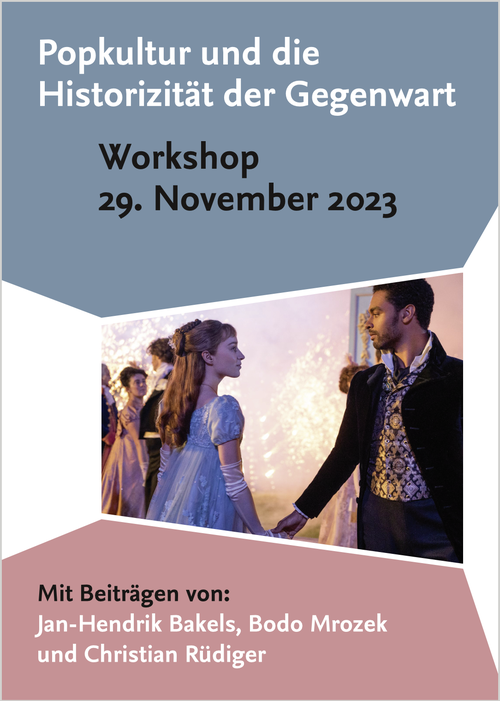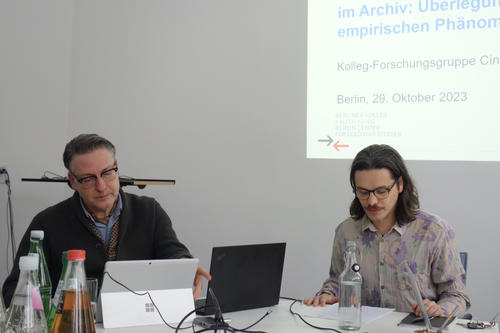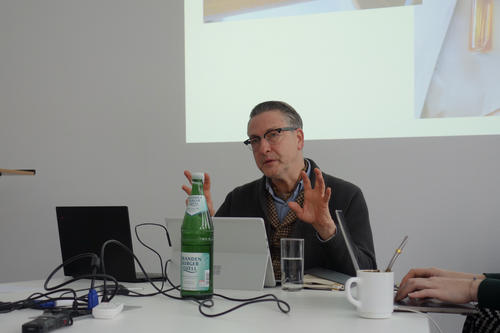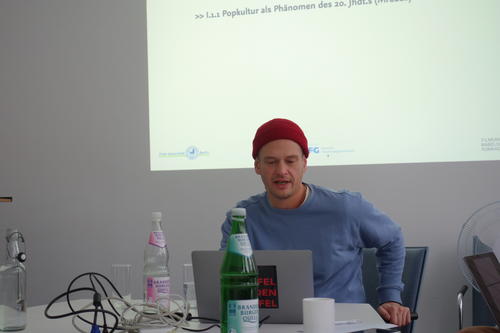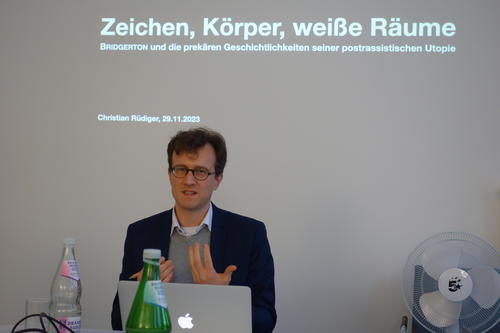Popkultur und die Historizität der Gegenwart
29.11.2023 | Workshop der Kolleg-Forschungsgruppe Cinepoetics mit Jan-Hendrik Bakels, Bodo Mrozek und Christian Rüdiger
Research Focus: Historical Phenomenology
Following the workshop title, "Pop Culture and the Historicity of the Present," the day started with a comprehensive introduction by Michael Ufer, that helped to differentiate the concept of "the present" by pointing to questions with which this topic can be approached:
How to think about historicity with regard to the accessibility of past and present perceptions? How to deal with the historical sense of pop culture as a sense based on relationality? What might popular reimaginings of historical experiences tell us about the present?
The heightened awareness of one’s individuality, a changing understanding of collectivity, as well as the particularity and instability of any public space, were just a few examples of "pluralities or modes of the present." In this sense, the following presentations illustrated the potential of understanding pop not only as an historical configuration but an aesthetic figuration of the present.
In his presentation "Sensing the Popular Past. Mit Edmund Husserl und Arlette Farge im Archiv: Überlegungen zu einer empirischen Phänomenologie," Bodo Mrozek asked about the opportunities and difficulties we face in archival encounters and made suggestions as to who can assist us through it. As the title suggests, he drawn on the help of Arlette Farge’s "logic of use of the archive," but alternated Husserl's perspective with Maurice Merleau-Ponty’s reflections on "sensing".
Mrozek pointed out difficulties of archiving popular culture – art collections are tied to the aesthetic tastes of their time; the masses are poorly represented in official collections – and argued for a multi-sensory approach to the "popular past" using supplementary sources. Mrozek calls such archival sources "protocols of past perception," which may help to recreate sensual experiences and by which he aims to measure the pop-cultural impact of past phenomena.
In the following presentation "Relationalität als Poetologie (audiovisueller) Pop-Kultur am Beispiel des Kinos der 1990er-Jahre," Jan-Hendrik Bakels focused on the "community-forming function" of taste in pop culture. By presenting a film analysis of RUSHMORE (Wes Anderson, USA 1998) he illustrated how the notion of taste can be approached through the concept of affectivity. Bakels followed Stuart Hall and defined (audiovisual) pop culture as a dynamic constellation of relations. He demonstrated how RUSHMORE works with historical connotations by using cinematic quotations, affective tonality and movement figurations from other films and explains how these "historical echoes" impact the affective quality of the movie. The result would be an affect dramaturgy of communitization that creates a retro version of the present (nostalgia) through a specific constellation of cinematic, fashionable and musical "artefacts" of the popular past.
In the final presentation on "Bridgerton und die prekären Geschichtlichkeiten seiner postrassistischen Utopie," Christian Rüdigerspoke about the popular Netflix series. He analyzed how the period drama creates a historical world in which race and racism do not exist and where black and non-white characters live among all social classes. But instead of creating a post-racial utopia, the series works with a white modality of experience within which non-white characters are displayed and experienced as foreign bodies. Rüdiger showed how a dramaturgy of the "white gaze" and figurations of movement create feelings of discomfort in the viewer's body when non-white characters enter such inherently white spaces. Following Sara Ahmed’s understanding of "whiteness as a category of experience that disappears as a category through experience," Rüdiger uncovered how BRIDGERTON creates a filmic experience for which applies: "Everyone is equal becomes everyone is white."
